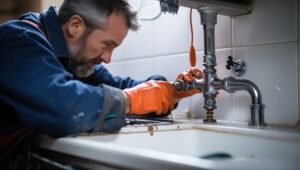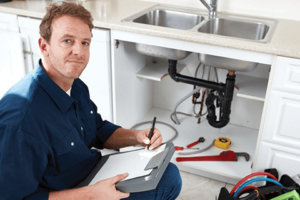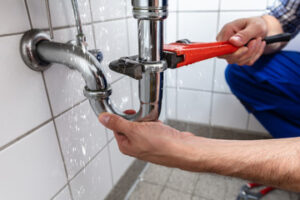Many homeowners experience plumbing issues that require Plumbers Topeka. These include clogged drains, leaky pipes, and poor water quality.
Plumbers know how to identify and fix these issues. They use specialized tools to remove surface-level clogs and can ensure that the problem doesn’t return. In addition, they can repair damaged pipes and install new ones.

Whether they carry Water or waste, your home’s drains are vital for proper function. But if you don’t keep them clean, they can become blocked and slow or even stop working completely. This can lead to a host of problems, from mildly irritating to life-threatening. It’s important to be able to spot a clog early on so that you can take the steps needed to clear it.
The first thing you should do when a drain becomes slow or doesn’t work at all is try running hot Water down it. This will help melt and break down any gunk that may be blocking the pipe. If this doesn’t work, try using a wire coat hanger or plumbing snake to clear the blockage. If these don’t work, it’s time to call in the pros.
If you notice a foul smell coming from your drain, this is a sign that the sewage system has backed up into the house. This can be dangerous and extremely costly to clean up, so it’s important to call a plumber as soon as possible.
One of the most common causes of a clogged drain is mineral build-up. This can occur in any pipe, but is particularly common in kitchen and bathroom drains. You can prevent this by regularly cleaning your drains and installing a water softener.
Another common cause of a clogged drain is flushing improper materials down the toilet. Items such as sanitary products, paper towels, and tampons can block pipes and obstruct drains. It’s also important to teach children about the importance of not flushing these items down the toilet.
The most serious clogs can often be caused by tree roots that grow into sewer and drainage lines. This can be very expensive to fix and requires removing the entire line in the ground.
If you have a severe clog, you can attempt to remove it with a plunger or plumber’s snake. A drain snake can be purchased at most hardware and grocery stores. However, you’ll need to know what type of pipe is involved to determine what size snake you’ll need. Most consumer-grade drain snakes only reach about 25 feet, so if the clog is further down the line, it’s best to call in a professional.
A plunger or plumber’s snake can be used to try and clear a stubborn clog. The majority of hardware and grocery stores sell drain snakes. To find out what size snake you’ll need, you’ll need to know what kind of pipe is involved. It is best to call in a professional if the clog is further down the line, as most consumer-grade drain snakes are only capable of reaching about 25 feet.
A leaking pipe can be quite a headache to deal with. Water can damage your walls, floors, and furniture, and it can also lead to expensive structural issues for your home. It’s important to have any leaking pipes repaired as soon as you notice them, so the problem doesn’t get worse over time. A plumber can fix your leaky pipes quickly and efficiently, preventing expensive problems in the future.
Leaking pipes are often caused by weakened connections. This can happen due to age, vibration, or even water hammer. A plumber can re-connect your pipe correctly, ensuring that it’s sealed properly and won’t leak in the future.
However, if you’re confident in your plumbing abilities, there are some simple DIY fixes that you can try to repair your leaky pipe. First, make sure that your water supply is completely shut off. This can be done by finding your water valve and turning it off, usually in a location like the garage or basement. Then, drain any remaining water in your pipes by flushing your toilets and opening up your faucets.
If you’re confident in your plumbing skills, you can try some easy do-it-yourself solutions to fix your leaky pipe. First, confirm that you have turned off your water supply entirely. To accomplish this, locate your water valve, which is typically located in the basement or garage, and turn it off. Next, flush your toilets and open your faucets to remove any last bits of water that may have accumulated in your pipes.
Then, find the source of your leak. It can be difficult to locate a leaky pipe, but you can look for signs of moisture, such as damp or dark areas, or listen for the sound of running Water. You can also use a detector to pinpoint the exact location of your leaking pipe.
Once you’ve found the source of your leak, there are a few different ways that you can fix it. One option is to use plumber’s tape to create a tight seal over the leaky connection. This is a relatively easy and inexpensive fix, but it’s only a temporary solution. A more permanent solution is to use a slip coupling. This is a more involved project, but it’s still fairly doable for most homeowners. You’ll need to buy a coupling that’s the same size and material as your existing pipe, then cut off the damaged section of pipe.
There are several methods for resolving your leak once you’ve located its source. One way is to cover the leaky connection with plumber’s tape and create a tight seal. This is only a temporary solution, but it’s a reasonably simple and affordable fix. Using a slip coupling is a more long-term fix. Although this is a more complex project, most homeowners can still manage it. After purchasing a coupling that matches the size and composition of your current pipe, you must cut off the damaged section of pipe.
Once you’ve finished your plumbing repair, turn the Water back on slowly and check to see if the leak is still present. If it is, you may need to repeat the process or call a professional plumber to take a closer look.
A lack of water pressure makes washing dishes, showering, and running appliances much more difficult. The good news is that most causes of low water pressure are easy to identify and inexpensive to fix. You may simply have a clog or a leak robbing you of your water supply.
The most obvious cause of poor water pressure is the supply line from the municipal water supply to your home. If this is the case, contact your water supplier to see what is causing the problem and when they expect it to be fixed.
In homes that have older plumbing, corroded pipes can also contribute to low water pressure. Over time, these metal pipes can start to rust and restrict the flow of Water, especially when multiple fixtures are being used at the same time. If this is a concern in your home, it is recommended that you replace the old pipes with copper or PEX lines.
Another common source of low water pressure is a malfunctioning water softener or home filtration system. It is important to regularly check the user manual for these systems, as it is possible that they may need to be bypassed temporarily until the issues are resolved.
If the aforementioned problems are not to blame, there could be a problem with the water pressure regulator. This is a common component that controls the water pressure throughout your home and is typically set to around 50 psi. If your home’s water pressure is lower than this, the regulator may need to be replaced.
Clogged pipes are often the result of mineral deposits, such as calcium, that have built up over time. Using hot Water and vinegar or baking soda can help to break up these deposits and unclog the pipe. If these solutions are not effective, it is best to have a plumber assess the situation and determine whether or not the pipe needs to be replaced.



